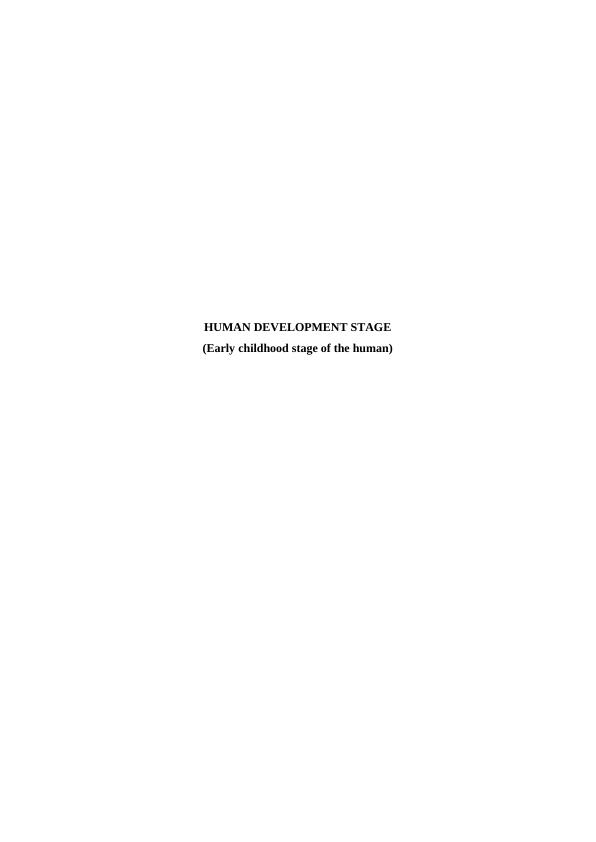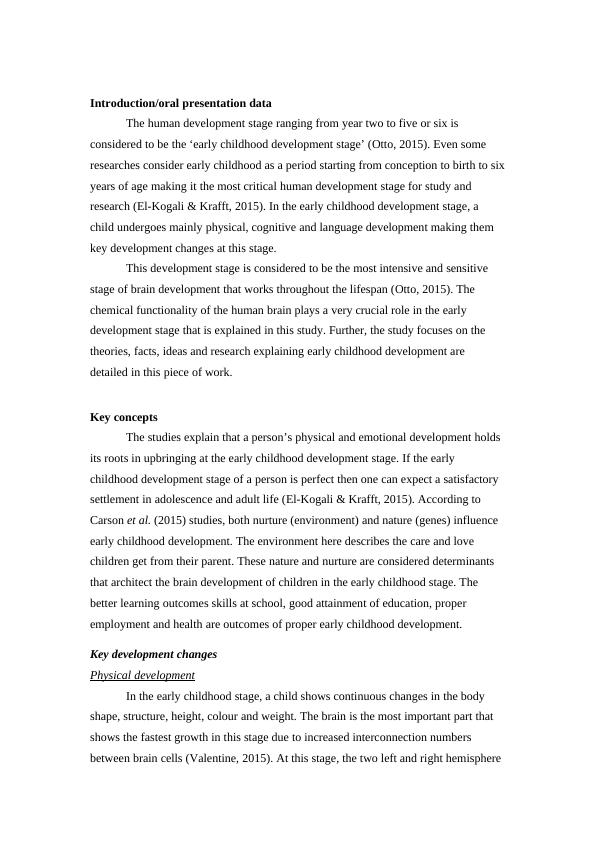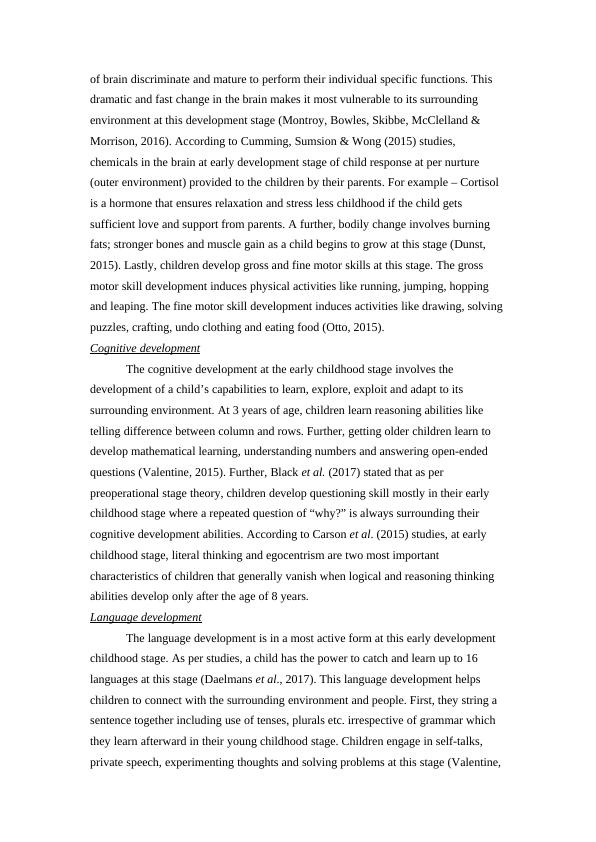Human Development Stage: Early Childhood Development
Added on 2023-01-04
9 Pages2289 Words21 Views
HUMAN DEVELOPMENT STAGE
(Early childhood stage of the human)
(Early childhood stage of the human)

Introduction/oral presentation data
The human development stage ranging from year two to five or six is
considered to be the ‘early childhood development stage’ (Otto, 2015). Even some
researches consider early childhood as a period starting from conception to birth to six
years of age making it the most critical human development stage for study and
research (El-Kogali & Krafft, 2015). In the early childhood development stage, a
child undergoes mainly physical, cognitive and language development making them
key development changes at this stage.
This development stage is considered to be the most intensive and sensitive
stage of brain development that works throughout the lifespan (Otto, 2015). The
chemical functionality of the human brain plays a very crucial role in the early
development stage that is explained in this study. Further, the study focuses on the
theories, facts, ideas and research explaining early childhood development are
detailed in this piece of work.
Key concepts
The studies explain that a person’s physical and emotional development holds
its roots in upbringing at the early childhood development stage. If the early
childhood development stage of a person is perfect then one can expect a satisfactory
settlement in adolescence and adult life (El-Kogali & Krafft, 2015). According to
Carson et al. (2015) studies, both nurture (environment) and nature (genes) influence
early childhood development. The environment here describes the care and love
children get from their parent. These nature and nurture are considered determinants
that architect the brain development of children in the early childhood stage. The
better learning outcomes skills at school, good attainment of education, proper
employment and health are outcomes of proper early childhood development.
Key development changes
Physical development
In the early childhood stage, a child shows continuous changes in the body
shape, structure, height, colour and weight. The brain is the most important part that
shows the fastest growth in this stage due to increased interconnection numbers
between brain cells (Valentine, 2015). At this stage, the two left and right hemisphere
The human development stage ranging from year two to five or six is
considered to be the ‘early childhood development stage’ (Otto, 2015). Even some
researches consider early childhood as a period starting from conception to birth to six
years of age making it the most critical human development stage for study and
research (El-Kogali & Krafft, 2015). In the early childhood development stage, a
child undergoes mainly physical, cognitive and language development making them
key development changes at this stage.
This development stage is considered to be the most intensive and sensitive
stage of brain development that works throughout the lifespan (Otto, 2015). The
chemical functionality of the human brain plays a very crucial role in the early
development stage that is explained in this study. Further, the study focuses on the
theories, facts, ideas and research explaining early childhood development are
detailed in this piece of work.
Key concepts
The studies explain that a person’s physical and emotional development holds
its roots in upbringing at the early childhood development stage. If the early
childhood development stage of a person is perfect then one can expect a satisfactory
settlement in adolescence and adult life (El-Kogali & Krafft, 2015). According to
Carson et al. (2015) studies, both nurture (environment) and nature (genes) influence
early childhood development. The environment here describes the care and love
children get from their parent. These nature and nurture are considered determinants
that architect the brain development of children in the early childhood stage. The
better learning outcomes skills at school, good attainment of education, proper
employment and health are outcomes of proper early childhood development.
Key development changes
Physical development
In the early childhood stage, a child shows continuous changes in the body
shape, structure, height, colour and weight. The brain is the most important part that
shows the fastest growth in this stage due to increased interconnection numbers
between brain cells (Valentine, 2015). At this stage, the two left and right hemisphere

of brain discriminate and mature to perform their individual specific functions. This
dramatic and fast change in the brain makes it most vulnerable to its surrounding
environment at this development stage (Montroy, Bowles, Skibbe, McClelland &
Morrison, 2016). According to Cumming, Sumsion & Wong (2015) studies,
chemicals in the brain at early development stage of child response at per nurture
(outer environment) provided to the children by their parents. For example – Cortisol
is a hormone that ensures relaxation and stress less childhood if the child gets
sufficient love and support from parents. A further, bodily change involves burning
fats; stronger bones and muscle gain as a child begins to grow at this stage (Dunst,
2015). Lastly, children develop gross and fine motor skills at this stage. The gross
motor skill development induces physical activities like running, jumping, hopping
and leaping. The fine motor skill development induces activities like drawing, solving
puzzles, crafting, undo clothing and eating food (Otto, 2015).
Cognitive development
The cognitive development at the early childhood stage involves the
development of a child’s capabilities to learn, explore, exploit and adapt to its
surrounding environment. At 3 years of age, children learn reasoning abilities like
telling difference between column and rows. Further, getting older children learn to
develop mathematical learning, understanding numbers and answering open-ended
questions (Valentine, 2015). Further, Black et al. (2017) stated that as per
preoperational stage theory, children develop questioning skill mostly in their early
childhood stage where a repeated question of “why?” is always surrounding their
cognitive development abilities. According to Carson et al. (2015) studies, at early
childhood stage, literal thinking and egocentrism are two most important
characteristics of children that generally vanish when logical and reasoning thinking
abilities develop only after the age of 8 years.
Language development
The language development is in a most active form at this early development
childhood stage. As per studies, a child has the power to catch and learn up to 16
languages at this stage (Daelmans et al., 2017). This language development helps
children to connect with the surrounding environment and people. First, they string a
sentence together including use of tenses, plurals etc. irrespective of grammar which
they learn afterward in their young childhood stage. Children engage in self-talks,
private speech, experimenting thoughts and solving problems at this stage (Valentine,
dramatic and fast change in the brain makes it most vulnerable to its surrounding
environment at this development stage (Montroy, Bowles, Skibbe, McClelland &
Morrison, 2016). According to Cumming, Sumsion & Wong (2015) studies,
chemicals in the brain at early development stage of child response at per nurture
(outer environment) provided to the children by their parents. For example – Cortisol
is a hormone that ensures relaxation and stress less childhood if the child gets
sufficient love and support from parents. A further, bodily change involves burning
fats; stronger bones and muscle gain as a child begins to grow at this stage (Dunst,
2015). Lastly, children develop gross and fine motor skills at this stage. The gross
motor skill development induces physical activities like running, jumping, hopping
and leaping. The fine motor skill development induces activities like drawing, solving
puzzles, crafting, undo clothing and eating food (Otto, 2015).
Cognitive development
The cognitive development at the early childhood stage involves the
development of a child’s capabilities to learn, explore, exploit and adapt to its
surrounding environment. At 3 years of age, children learn reasoning abilities like
telling difference between column and rows. Further, getting older children learn to
develop mathematical learning, understanding numbers and answering open-ended
questions (Valentine, 2015). Further, Black et al. (2017) stated that as per
preoperational stage theory, children develop questioning skill mostly in their early
childhood stage where a repeated question of “why?” is always surrounding their
cognitive development abilities. According to Carson et al. (2015) studies, at early
childhood stage, literal thinking and egocentrism are two most important
characteristics of children that generally vanish when logical and reasoning thinking
abilities develop only after the age of 8 years.
Language development
The language development is in a most active form at this early development
childhood stage. As per studies, a child has the power to catch and learn up to 16
languages at this stage (Daelmans et al., 2017). This language development helps
children to connect with the surrounding environment and people. First, they string a
sentence together including use of tenses, plurals etc. irrespective of grammar which
they learn afterward in their young childhood stage. Children engage in self-talks,
private speech, experimenting thoughts and solving problems at this stage (Valentine,

End of preview
Want to access all the pages? Upload your documents or become a member.
Related Documents
Developmental Milestones, Stages and Early Interventions for Childrenlg...
|9
|2686
|120
Human Development Across the Lifespanlg...
|8
|2053
|361
Theories of Healthy Childhood Developmentlg...
|14
|2145
|50
Assignment about Early Brain Developmentlg...
|9
|1328
|26
Masters Early Childhood Curriculum: Key Elements and Aspectslg...
|16
|6197
|217
Cognitive Development in Early Childhoodlg...
|4
|641
|49
